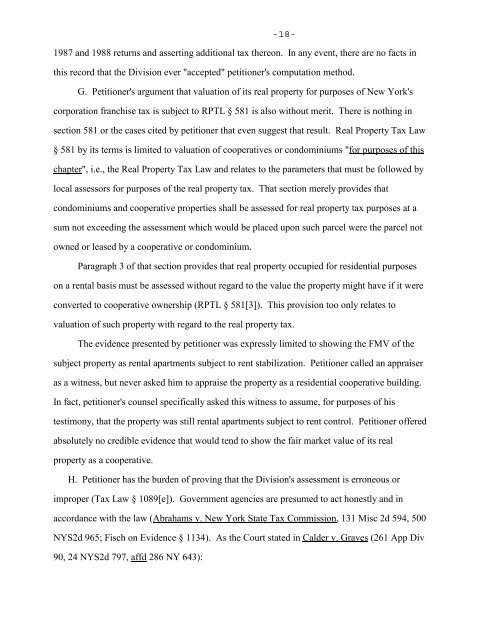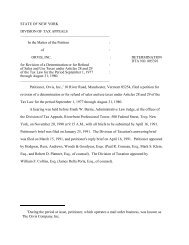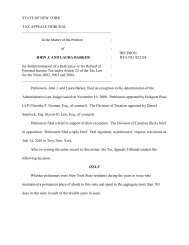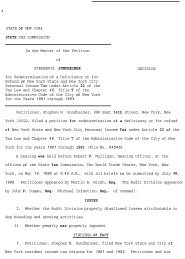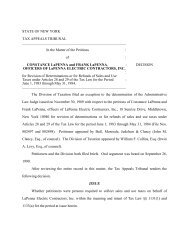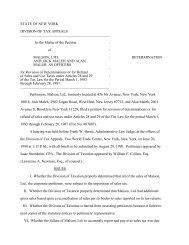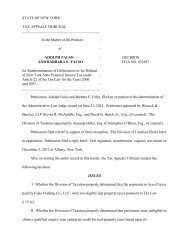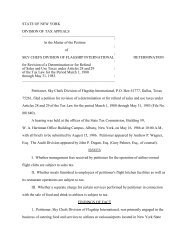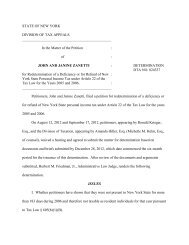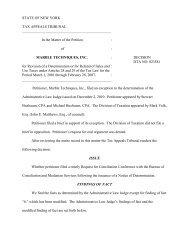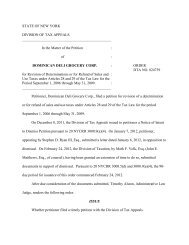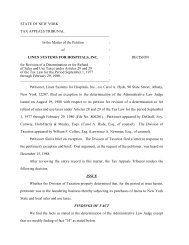STATE OF NEW YORK DIVISION OF TAX APPEALS In the Matter of ...
STATE OF NEW YORK DIVISION OF TAX APPEALS In the Matter of ...
STATE OF NEW YORK DIVISION OF TAX APPEALS In the Matter of ...
Create successful ePaper yourself
Turn your PDF publications into a flip-book with our unique Google optimized e-Paper software.
-18-<br />
1987 and 1988 returns and asserting additional tax <strong>the</strong>reon. <strong>In</strong> any event, <strong>the</strong>re are no facts in<br />
this record that <strong>the</strong> Division ever "accepted" petitioner's computation method.<br />
G. Petitioner's argument that valuation <strong>of</strong> its real property for purposes <strong>of</strong> New York's<br />
corporation franchise tax is subject to RPTL § 581 is also without merit. There is nothing in<br />
section 581 or <strong>the</strong> cases cited by petitioner that even suggest that result. Real Property Tax Law<br />
§ 581 by its terms is limited to valuation <strong>of</strong> cooperatives or condominiums "for purposes <strong>of</strong> this<br />
chapter", i.e., <strong>the</strong> Real Property Tax Law and relates to <strong>the</strong> parameters that must be followed by<br />
local assessors for purposes <strong>of</strong> <strong>the</strong> real property tax. That section merely provides that<br />
condominiums and cooperative properties shall be assessed for real property tax purposes at a<br />
sum not exceeding <strong>the</strong> assessment which would be placed upon such parcel were <strong>the</strong> parcel not<br />
owned or leased by a cooperative or condominium.<br />
Paragraph 3 <strong>of</strong> that section provides that real property occupied for residential purposes<br />
on a rental basis must be assessed without regard to <strong>the</strong> value <strong>the</strong> property might have if it were<br />
converted to cooperative ownership (RPTL § 581[3]). This provision too only relates to<br />
valuation <strong>of</strong> such property with regard to <strong>the</strong> real property tax.<br />
The evidence presented by petitioner was expressly limited to showing <strong>the</strong> FMV <strong>of</strong> <strong>the</strong><br />
subject property as rental apartments subject to rent stabilization. Petitioner called an appraiser<br />
as a witness, but never asked him to appraise <strong>the</strong> property as a residential cooperative building.<br />
<strong>In</strong> fact, petitioner's counsel specifically asked this witness to assume, for purposes <strong>of</strong> his<br />
testimony, that <strong>the</strong> property was still rental apartments subject to rent control. Petitioner <strong>of</strong>fered<br />
absolutely no credible evidence that would tend to show <strong>the</strong> fair market value <strong>of</strong> its real<br />
property as a cooperative.<br />
H. Petitioner has <strong>the</strong> burden <strong>of</strong> proving that <strong>the</strong> Division's assessment is erroneous or<br />
improper (Tax Law § 1089[e]). Government agencies are presumed to act honestly and in<br />
accordance with <strong>the</strong> law (Abrahams v. New York State Tax Commission, 131 Misc 2d 594, 500<br />
NYS2d 965; Fisch on Evidence § 1134). As <strong>the</strong> Court stated in Calder v. Graves (261 App Div<br />
90, 24 NYS2d 797, affd 286 NY 643):


